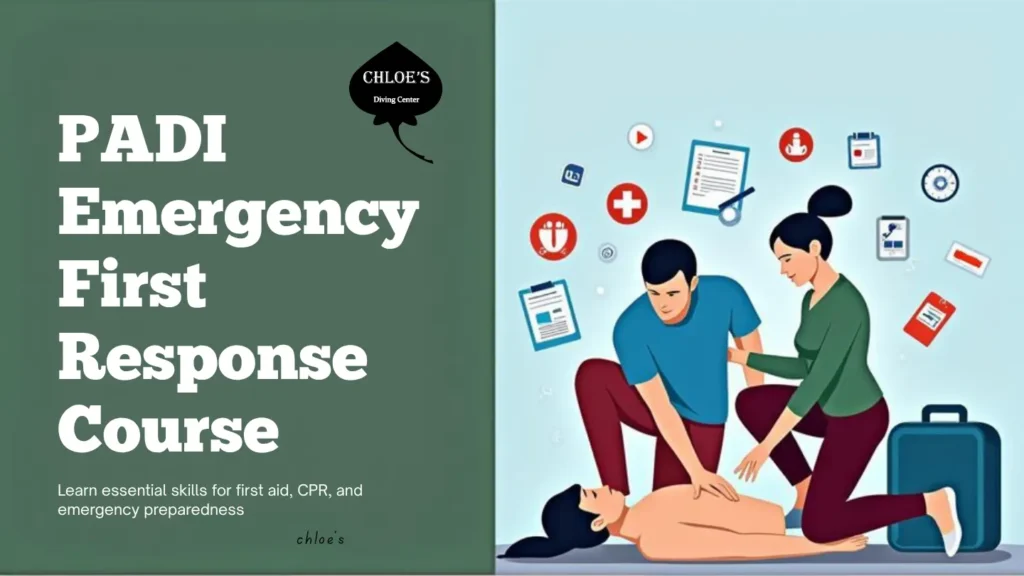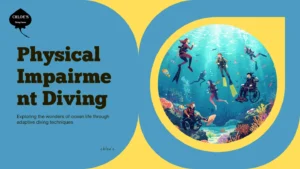What Is the PADI Emergency First Response Course 2026 in Egypt?
The PADI Emergency First Response Course is designed to provide individuals, whether divers or non-divers, with essential life-saving skills recognized worldwide. In Egypt, particularly in Hurghada, this course goes beyond basic first aid, equipping participants with emergency care skills, CPR techniques, and practical knowledge for both water-related and land emergencies.
Unlike traditional first aid courses, the PADI EFR emphasizes real-life applications and decision-making in critical situations. Participants gain confidence in handling accidents, performing CPR and first aid, and using tools such as an AED (Automated External Defibrillator). Completing this course ensures that you have globally recognized PADI certification and the knowledge to respond effectively in emergencies, enhancing both personal and group safety.
Whether you aim to pursue professional diving certifications or simply want the skills to assist others in an emergency, the PADI Emergency First Response Course equips you with actionable, practical skills applicable in everyday life and underwater environments alike.
Why Should You Take the PADI Emergency First Response Course in Hurghada?
Taking the PADI Emergency First Response Course equips you with vital lifesaving skills, including CPR and first aid. In Hurghada, you gain practical, hands-on training in a supportive environment, enhancing confidence in emergencies both on land and during water activities like diving.
How Does This Course Prepare You for Diving Emergencies?
The PADI Emergency First Response Course prepares participants for emergencies that can arise while diving or during water-based activities. Through a combination of theory and hands-on practice, you learn to quickly assess situations, identify life-threatening conditions, and provide primary care until professional help arrives.
Training includes rescue techniques, accident response, and practical scenarios under the supervision of a certified EFR instructor. By mastering CPR training, first aid certification, and emergency procedures, you develop the ability to act calmly and effectively under pressure. This skill set not only benefits divers in Hurghada but is also valuable in everyday life, reinforcing general health and safety awareness.
What Real-Life Situations Does the Course Simulate?
The PADI EFR course emphasizes realistic scenarios to build confidence and readiness:
- Responding to choking or airway obstruction
- Treating minor cuts, burns, and scrapes
- Managing allergic reactions or asthma attacks
- Performing CPR on adults, children, and infants
- Using an AED during cardiac emergencies
- Handling shock, hypothermia, and fainting
Simulated emergencies help participants understand the importance of timing, proper technique, and teamwork, making the life-saving course practical and immersive.
How Can It Improve Safety While Diving in Egypt?
Safety is critical in Egypt’s popular diving destinations. By completing the PADI Emergency First Response Course, divers gain essential skills to:
- Recognize and manage decompression sickness
- Administer immediate care after surfacing
- Stabilize injured divers until professional support arrives
- Improve group safety awareness through safety training
These abilities reduce risks for individuals and groups, making diving safer and more enjoyable in Hurghada and beyond.
Why Is Hurghada the Best Location to Learn First Response Skills?
Hurghada is ideal due to its world-class diving centers, experienced instructors, and safety-focused environment. The city combines excellent training facilities with real-world scenarios in water-based activities, making it perfect for practicing emergency response skills effectively.
What Makes Hurghada a Global Diving Hub?
Hurghada offers crystal-clear waters, vibrant coral reefs, and well-equipped dive centers. Its reputation as an international PADI training destination makes it ideal for combining practical diving experiences with first responder course training. Learning in this environment allows participants to immediately contextualize emergency scenarios and apply their new skills in realistic conditions.
How Does Local Training Add Value to Your Certification?
Training locally in Hurghada provides additional benefits:
- Exposure to common diving risks in Egyptian waters
- Hands-on practice under experienced EFR instructors
- Networking with international divers and trainers
- Immediate application of emergency preparedness techniques in real diving environments
This contextual experience enhances the credibility and applicability of your PADI certification, making it more than just a paper credential.
What Skills Do You Learn in the PADI Emergency First Response Course?
The course teaches CPR for adults, children, and infants, primary and secondary care, injury assessment, breathing emergencies, and basic first aid. Participants also learn scene safety, patient evaluation, and response techniques essential for handling emergencies confidently on land or during diving activities.
How Do You Learn Primary Care (CPR) Techniques?
Primary care focuses on CPR training, teaching participants how to respond to life-threatening emergencies such as cardiac arrest. Using manikins and guided exercises, learners practice:
- Assessing responsiveness and breathing
- Performing chest compressions and rescue breaths
- Following adult, child, and infant CPR protocols
- Coordinating with emergency medical services
This foundation ensures participants can confidently provide immediate aid in critical situations.
Why Is CPR Training Essential for Divers?
Cardiac emergencies or drowning incidents can occur during diving. Mastering CPR ensures participants can sustain life until professional assistance arrives. CPR is a universally applicable skill, extending its value beyond diving and into everyday emergencies, reinforcing your role as a trained first responder.
What Step-by-Step CPR Methods Are Covered?
The course covers systematic procedures:
- Assessing scene safety and responsiveness
- Checking for normal breathing
- Administering chest compressions and rescue breaths
- Using proper compression-to-breath ratios for adults, children, and infants
- Coordinating emergency response efficiently
These steps follow basic life support protocols recognized globally.
What Secondary Care (First Aid) Skills Are Taught?
Secondary care addresses injuries and conditions that, while not immediately life-threatening, still require proper attention. Skills include:
- Treating cuts, burns, and fractures
- Managing shock and fainting
- Responding to allergic reactions
- Stabilizing injured individuals before medical help arrives
How Do You Handle Common Diving Injuries?
Participants learn to address frequent diving-related issues such as:
- Barotrauma affecting ears and sinuses
- Coral cuts and abrasions
- Hypothermia from prolonged water exposure
- Marine stings and bites
This training ensures divers can respond effectively while minimizing risks.
What First Aid Tools Will You Learn to Use?
Hands-on experience includes:
- Bandages, splints, and dressings
- Cold packs for burns and bruises
- Emergency oxygen kits
- Automated External Defibrillators (AEDs)
Using these tools correctly is integral to a complete emergency care skills foundation.
Does the Course Teach AED (Automated External Defibrillator) Use?
Yes, the PADI Emergency First Response Course includes AED training. You learn how to operate an automated external defibrillator safely, integrate it into emergency response, and follow proper protocols for sudden cardiac arrest situations.
Why Is AED Knowledge Critical for Diving Emergencies?
Cardiac arrest can happen during or after dives. Learning to operate an AED is essential, as timely use can dramatically improve survival chances. The PADI Emergency First Response Course ensures participants are confident and proficient in applying AEDs during emergencies, making it a vital component of life-saving courses for divers.
How Long Does the PADI Emergency First Response Course Take in Egypt?
The course typically lasts one to two days, depending on scheduling and participant pace. It combines theory sessions, practical skills, and hands-on scenarios to ensure full understanding and confidence in performing first aid and CPR techniques.
What Is the Average Duration for Completion?
The course typically takes 16–20 hours, often spread over two days, combining theory and practical sessions. This schedule allows participants to fully absorb emergency procedures, rescue techniques, and hands-on CPR and first aid practice without rushing.
Can You Complete It in Just One Day in Hurghada?
Yes, intensive one-day courses are available for motivated learners, particularly tourists with limited time. These condensed sessions maintain the quality of training while covering all essential safety skills and practical exercises.
How Flexible Are the Training Schedules for Tourists?
Hurghada dive centers offer flexible schedules, including morning, afternoon, and weekend options, catering to travelers and divers who wish to combine training with diving experiences. This flexibility ensures convenient access to internationally recognized PADI training programs.
Who Can Enroll in the PADI Emergency First Response Course?
Anyone aged 12 and older can enroll. No prior experience is required, making it suitable for divers, travelers, or anyone interested in lifesaving skills. Participants must be physically capable of performing CPR and first aid procedures safely.
Is There an Age Requirement for Participants?
The course is generally open to participants aged 12 years and above, with modified training for younger learners to ensure safety while providing comprehensive first responder course knowledge.
Do You Need Any Previous Diving Certification?
No prior diving experience is required. While the PADI EFR complements diving courses, it is accessible to anyone seeking CPR and first aid certification or enhancing emergency preparedness skills.
Can Non-Divers Join the Course in Hurghada?
Absolutely. Non-divers can fully benefit from the course, gaining critical life-saving skills, medical emergency response knowledge, and globally recognized PADI certification applicable in professional and recreational contexts.
How Much Does the PADI Emergency First Response Course Cost in Egypt?
Course fees in Egypt generally range from $150 to $250, depending on the center and package offered. Prices usually include study materials, hands-on training, and certification upon successful completion.
What Is the Average Price in Hurghada?
In Hurghada, the PADI Emergency First Response Course generally costs between $150–$200, depending on the dive center and inclusions.
How Does It Compare to Other Diving Cities Worldwide?
Hurghada offers competitive pricing compared to international diving hubs, often providing higher value due to hands-on practice, small class sizes, and access to experienced EFR instructors.
Know More About: Daily Diving Prices In Hurghada
What Is Included in the Course Fee?
Course fees typically include:
- Course materials and manuals
- Access to CPR manikins and first aid equipment
- Certified instruction by EFR instructors
- Course completion card (PADI certification)
Are There Any Additional Costs You Should Expect?
Additional costs may include:
- Optional practice sessions
- Transportation to remote training sites
- Booking fees for intensive one-day courses
Overall, fees are transparent and provide excellent value for the life-saving course.
What Is the Certification Process for the PADI Emergency First Response Course?
After completing theory lessons and practical skills assessments, participants are evaluated through hands-on scenarios. Successful candidates receive an official PADI Emergency First Response certification, valid worldwide and recognized for both diving and general emergency preparedness.
How Do You Pass the Knowledge Development Section?
Participants complete knowledge development modules via interactive discussions, online study, or written exams. Understanding emergency procedures, accident response, and health and safety guidelines is essential for passing.
What Practical Skills Do You Need to Demonstrate?
Practical skills include:
- CPR for adults, children, and infants
- Proper use of AEDs
- First aid techniques for minor injuries and shocks
- Rescue procedures for aquatic and land emergencies
Successful demonstration leads to PADI EFR certification.
How Long Is the Certification Valid for?
The PADI Emergency First Response Course certification is valid for two years, after which a refresher or renewal is recommended to maintain skills and compliance with 2026 guidelines.
How Does the PADI Emergency First Response Course Relate to Other PADI Programs?
The course is a prerequisite for many PADI diving programs, including Rescue Diver and Divemaster courses. It provides essential lifesaving skills that enhance safety and confidence, making it an important foundation for all advanced PADI certifications.
Is It a Requirement for the PADI Rescue Diver Course?
Yes. Completion of the PADI Emergency First Response Course is a prerequisite for the PADI Rescue Diver Course, ensuring that candidates are proficient in rescue techniques and medical emergency response.
Can It Be Used for Professional-Level PADI Training?
Absolutely. Lifeguards, dive masters, instructors, and professional divers benefit from EFR certification, which serves as a foundation for advanced safety training and rescue skills.
How Does It Connect to Daily Life Outside Diving?
The life-saving skills acquired are applicable in workplaces, homes, or public areas. CPR and first aid certification equips participants to respond confidently to everyday emergencies.
What Are the Benefits of Taking the Course in 2026?
In 2026, updated course materials and techniques ensure participants learn modern emergency response methods. Completing the course enhances personal safety, prepares you for diving emergencies, and increases employability in water sports, travel, or healthcare-related fields.
How Has the Curriculum Evolved Over the Years?
The 2026 curriculum incorporates the latest emergency care skills, emphasizing realism, updated safety procedures, and improved teaching methods.
What New Standards and Guidelines Are Applied in 2026?
Standards include:
- Updated CPR compression ratios and timing
- Enhanced AED usage protocols
- Revised first aid procedures for drowning and marine injuries
- Internationally recognized PADI training program guidelines
Why Should You Update Your Certification Regularly?
Regular updates ensure proficiency, compliance with new standards, and confidence in applying rescue techniques in both diving and non-diving contexts.
How Do You Book the PADI Emergency First Response Course in Hurghada?
You can book online via official PADI centers or local diving schools in Hurghada. Contacting centers directly by phone or email is common. Early booking is recommended, especially during peak tourist seasons, to secure preferred dates and ensure availability.
Can You Book Online Before Traveling to Egypt?
Yes. Many Hurghada dive centers allow online bookings, offering convenience and guaranteed placement in your preferred schedule.
What Local Dive Centers Offer the Course?
Reputable centers include internationally recognized PADI facilities that provide experienced EFR instructors, fully equipped training rooms, and flexible schedules.
How Early Should You Reserve Your Spot?
Booking 2–4 weeks in advance is recommended, especially during peak tourist seasons, to ensure availability and access to preferred instructors.
Ready to gain globally recognized life-saving skills? Visit chloes-diving.com to book your PADI Emergency First Response Course in Hurghada today and take the first step towards mastering emergency preparedness in 2026.
What Is the Difference Between PADI EFR and Regular First Aid Training?
PADI EFR focuses on diving-related emergencies, AED use, and structured rescue techniques, while regular first aid covers general scenarios without diving context.
How Long Does the PADI EFR Certification Stay Valid?
Certification is valid for two years, after which a refresher is recommended.
Can Children Take the PADI Emergency First Response Course?
Yes, participants aged 12 and above can enroll, with modified content for younger learners.
Is the Course Recognized Worldwide Outside Egypt?
Yes. PADI certification is globally recognized, enhancing employability and travel safety.
Do You Need to Be a Diver to Take the PADI EFR Course?
No, non-divers can enroll and benefit from life-saving skills and first responder training.
What Equipment or Materials Do You Need During Training?
Course materials, manikins, first aid kits, and AEDs are provided by the dive center.
How Does the PADI EFR Course Improve Your Diving Confidence?
Knowing emergency procedures reduces anxiety and enhances safety awareness underwater.
Can You Combine the PADI EFR with Other Diving Packages in Hurghada?
Yes, many centers offer bundled packages for convenience.
How Often Should You Refresh or Renew Your Certification?
Every two years to maintain skills and compliance with updated standards.
What Makes the 2026 Course Standards Different From Previous Years?
New guidelines, improved rescue techniques, AED protocols, and enhanced CPR methods reflect the latest international safety standards.



